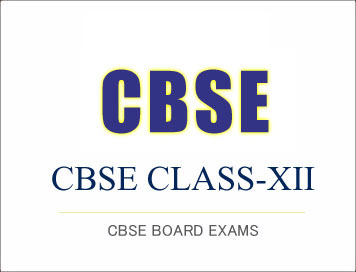CBSE Class-12 Syllabus 2019-20 (Sociology)
Disclaimer: This website is NOT associated with CBSE, for official website of CBSE visit - www.cbse.gov.in
CBSE Class-12 Syllabus 2019-20 (Sociology)
Rationale
Sociology is introduced as an elective subject at the senior secondary stage. The syllabus is designed to help learners to reflect on what they hear and see in the course of everyday life and develop a constructive attitude towards society in change; to equip a learner with concepts and theoretical skills for the purpose. The curriculum of Sociology at this stage should enable the learner to understand dynamics of human behaviour in all its complexities and manifestations. The learners of today need answers and explanations to satisfy the questions that arise in their minds while trying to understand social world. Therefore, there is a need to develop an analytical approach towards the social structure so that they can meaningfully participate in the process of social change. There is scope in the syllabus not only for interactive learning, based on exercises and project work but also for teachers and students to jointly innovate new ways of learning.
- Sociology studies society. The child’s familiarity with the society in which she /he lives in makes the study of Sociology a double edged experience. At one level Sociology studies institutions such as family and kinship, class, caste and tribe religion and region- contexts with which children are familiar of, even if differentially. For India is a society which is varied both horizontally and vertically. The effort in the books will be to grapple overtly with this both as a source of strength and as a site for interrogation.
- Significantly the intellectual legacy of Sociology equips the discipline with a plural perspective that overtly engages with the need for defamiliarization, to unlearn and question the given. This interrogative and critical character of Sociology also makes it possible to understand both other cultures as well as relearn about one’s own culture.
- This plural perspective makes for an inbuilt richness and openness that not too many other disciplines in practice share. From its very inception Sociology has had mutually enriching and contesting traditions of an interpretative method that openly takes into account ‘subjectivity’ and causal explanations that pay due importance to establishing causal correspondences with considerable sophistication. Not surprisingly its field work tradition also entails large scale survey methods as well as a rich ethnographic tradition. Indeed Indian sociology, in particular has bridged this distinction between what has often been seen as distinct approaches of Sociology and social anthropology. The syllabus provides ample opportunity to make the child familiar with the excitement of field work as well as its theoretical significance for the very discipline of Sociology.
- The plural legacy of Sociology also enables a bird’s eye view and a worm’s eye view of the society the child lives in. This is particularly true today when the local is inextricably defined and shaped by macro global processes.
- The syllabus proceeds with the assumption that gender as an organizing principle of society cannot be treated as an add on topic but is fundamental to the manner that all chapters shall be dealt with.
- The chapters shall seek for a child centric approach that makes it possible to connect the lived reality of children with social structures and social processes that Sociology studies.
- A conscious effort will be made to build into the chapters a scope for exploration of society that makes learning a process of discovery. A way towards this is to deal with sociological concepts not as givens but a product of societal actions humanly constructed and therefore open to questioning.
SOCIOLOGY (Code No. 039)
CLASS–XII (2018-19)
One Paper Theory
Marks 80
Unitwise Weightage
3 hours
|
Units |
|
Periods |
Marks |
|
A. |
Indian Society |
|
|
|
|
1. Introducing Indian Society |
6 |
Non-evaluative |
|
|
2. The Demographic Structure of Indian Society |
10 |
6 |
|
|
3. Social Institutions-Continuity and Change |
12 |
6 |
|
|
4. Market as a Social Institution |
10 |
6 |
|
|
5. Patterns of Social Inequality and Exclusion |
20 |
6 |
|
|
6. Challenges of Cultural Diversity |
20 |
8 |
|
|
7. Suggestions for Project Work |
16 |
Non-evaluative |
|
|
|
Total |
32 |
|
B. |
Change and Development in Indian Society |
|
|
|
|
8. Structural Change |
10 |
6 |
|
|
9. Cultural Change |
12 |
6 |
|
|
10. The Story of Indian Democracy |
16 |
6 |
|
|
11. Change and Development in Rural Society |
10 |
6 |
|
|
12. Change and Development in Industrial Society |
14 |
6 |
|
|
13. Globalization and Social Change |
10 |
6 |
|
|
14. Mass Media and Communications |
14 |
6 |
|
|
15. Social Movements |
20 |
6 |
|
|
|
Total |
48 |
|
|
|
200 |
80 |
Click Here To Download Full Syllabus
Courtesy: CBSE
